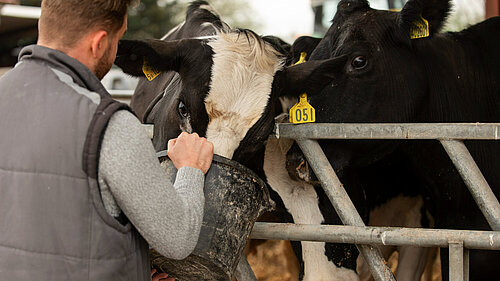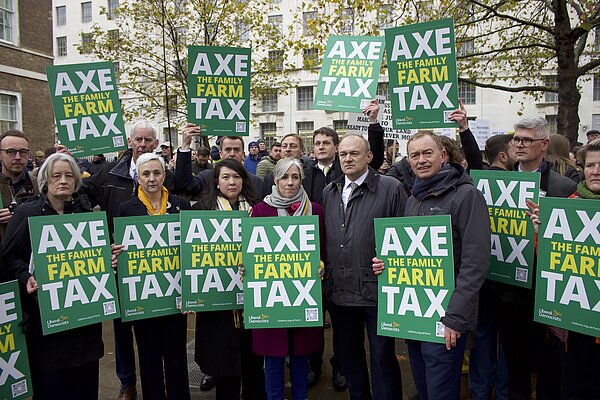The Family Farm Tax explained

What the Government’s doing, and why we’re opposing it
This is a tremendously difficult time for farmers. They are key allies in tackling climate change and restoring the countryside to good health, while producing high quality food for our tables.
For years, farmers were let down and taken for granted by the Conservatives. They deserve better now.
What is the Family Farm Tax?
At the moment, farmland is exempt from inheritance tax under a policy called “Agricultural Property Relief” (APR). In the Budget, the Chancellor announced that she will end that exemption by restricting APR.
The cut to APR will mean that from April 2026, a tax of 20% will apply to agricultural assets over £1 million. (Because of the existing tax-free threshold for inheritance tax, two parents leaving a farm to their children could potentially limit the tax to assets over £3 million.)
Why is the Government doing this?
The Chancellor claims we need this change to raise money for our public services – and we certainly understand the challenge of repairing the terrible damage the Conservatives did to both our public services and our public finances.
But the Family Farm Tax is only expected to raise around £115 million a year – less than 0.01% of government spending and less than 0.3% of all the tax rises announced by Rachel Reeves in this Budget.
(The Treasury hasn’t published the £115 million figure – it only says that the cut to APR, combined with a similar cut to the much bigger Business Property Relief, is expected to raise around £520 million a year.)
Why are we opposing it?
This Family Farm Tax will be a hammer blow to many farmers and cause real harm to our rural communities.
There are thousands of families across the UK with farms that are worth a lot on paper, but who are earning less than the minimum wage. They have endured cuts to their incomes while the cost of energy, fertiliser and feed bills has soared. They have been undermined by botched Conservative trade deals. And they are contending with the devastating impacts of adverse weather events.

To pay this new inheritance tax bill, many farmers will be forced to sell their farms, likely to private equity firms and large corporations who have no interest in looking after our countryside. That isn’t fair to hardworking farmers. It will reduce food production and undermine food security. And it will harm our environment, by taking land away from those who have nurtured it for generations.
The Government didn’t consult on these plans or produce a proper impact assessment. The Treasury even ignored the Department for Environment, Food and Rural Affairs (DEFRA), who urged it to at least water the change down.
What would we do instead?
The Government didn’t need to do this. We have set out a number of ways the Government could raise revenue much more fairly for the NHS, social care and our other public services.
It could have reversed the Conservatives’ tax cuts for the big banks. It could have increased Remote Gaming Duty on the growing profits of online gambling firms, or raised the Digital Services Tax on social media companies and other tech giants.
Instead of hurting British farmers, we would support them. Our manifesto set out plans for an extra £1 billion a year to support profitable, sustainable and nature-friendly farming across the UK. We have also set out a detailed plan to rebuild our relationship with Europe, bringing down barriers to trade – including a comprehensive veterinary agreement to help our farmers.
How were farmers let down by the Conservatives?
The Conservatives lost the right to speak up for rural communities when they betrayed our farmers with bad trade deals and a bungled transition away from the Basic Payments Scheme.

We support the move to public money for public goods, but many farmers are seeing their incomes threatened as their old payments are cut and new payments are not fully rolled out or properly funded. Farming subsidies have fallen by 20% in real terms since 2015 – equivalent to the loss of £722 million in public funding for farmers.
The Conservatives’ botched Brexit deal put up new barriers to trade with our nearest neighbours, making it harder for British farmers to sell to Europe. And their trade deals with Australia and New Zealand undermine our animal welfare and environmental standards, undercutting responsible British farmers.
What other challenges are farmers facing now?
If we care about our environment and if we care about our food security, we must provide farmers with more support.
Last year alone 8,100 UK farms closed their doors – equal to one in 25 of all farms in the country. The Government's own figures show that farm business income last year was lower for all types of farm but one.
And yet, the government has also decided to accelerate the phase out of direct payments to farmers under the Basic Payment Scheme – all recipients will see the base amount of their payments cut by 76% next year.
These cuts must be urgently reviewed if we’re to give farmers a fighting chance of sustainably and profitably feeding the nation and protecting our natural environment.
Join the campaign
Stop the Family Farm Tax
We oppose Labour's damaging Family Farm Tax.